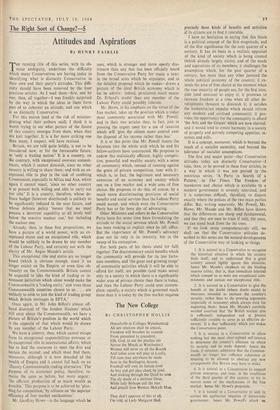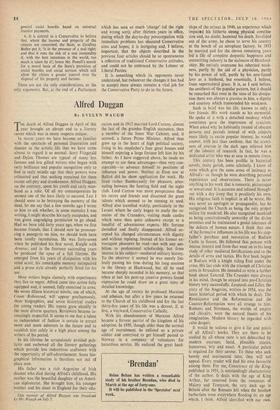The Right Sort of Change?-5
Attitudes and Aspirations
By HENRY FAIRL1E
Tan running title of this series, with its ob- vious ambiguity, underlines the difficulty Which many Conservatives are having :today in identifying what is distinctly Conservative in their own and their party's attitudes. This diffi- culty should have been removed by the four previous articles. As J read them—first, one by one; then, all together—I was frankly surprised by the way in which the ideas in them form Part of so coherent an attitude, and one which is so distinctly Conservative.
For this reason (and at the risk of misinter- preting what their authors said), I think it is worth trying to see what picture of the future of this country emerges from them, when they are knit together. It is a far more striking one than many, I suspect, will have realised.
Britain, we are told quite boldly, is not to be considered now, or for the foreseeable future, as 'only a trading nation.' It is a country, on the contrary, with exceptional overseas commit- ments, which it cannot diminish, since no other country is willing to share them; and with an ex- ceptional role to play in the task of confining Communism, especially in Africa and Asia, which again it cannot reject, 'since no other country is at present both willing and able to carry out our retie.' It is a country, therefore, whose de- fence budget (however distributed) is unlikely to be significantly reduced in the near future, and Whose defence policy 'means that we must Possess a deterrent capability at all levels well below the massive nuclear one,' but including the nuclear one.
Already, then, in these first propositions, we have a picture of a world power, with an ex- ceptional status and an exceptional role, which Would be unlikely to be drawn by any member of the Labour Party, and certainly not with the clarity of Mr. Angus Maude's article.
This exceptional role and status are no longer based (which is obvious enough, since it no longer exists) on the Empire, or even (less ob- viously) on the Commonwealth. Britain cannot be expected to take the kind of trading or in- vestment initiatives which alone would make the Commonwealth a 'trading entity,' and 'even those Commonwealth countries closest to us . . . are unlikely to.wish to join the kind of trading group Which Britain envisages in EFTA.'
Once again, in Mr. John Biffen's almost off- hand dismissal of 'the fondest illusions' which Still exist about the Commonwealth, we have a Picture of Britain's position in the world which is the opposite of that which would be drawn by any member of the Labour Party.
We have a country, then, which cannot escape from its exceptional responsibilities overseas or its exceptional role in international affairs; which has to find the resources to meet the first and sustain the second; and which must find them, moreover, although it is now denuded of the Wealth of gmpire and it cannot fall back on an 'illusory Commonwealth trading alternative.' The Purpose of its economic policy, therefore, re- mains the same as before, but more urgent: 'the efficient production of as much wealth as Possible.' This purpose is to be achieved by 'plan- ning for competition,' by reliance on 'the superior efficiency of free market mechanisms.'
Mr. Geoffrey Howe—in the language which he uses, which is stronger and more openly doc- trinaire than any that has been officially heard from the Conservative Party for many a year; in the broad aims which he stipulates; and in the detailed proposal which he makes—draws a picture of the ideal British economy which is (as he admits: indeed, proclaims) much nearer Dr. Erhard's model than any member of the Labour Party could possibly tolerate.
Mr. Howe, in his emphasis on the virtue of the free market, takes up the position which is today most commonly associated with Mr. Powell; and in their two articles they, in fact, join in pressing the urgent need for a use of taxation which will 'give the citizen more control over the disposal of his income rather than less.'
It is at this point that Mr. Powell inserts the keystone into the whole arch which he and his fellow-authors have constructed. He proposes to endow this realistically efficient, highly competi- tive, powerful and wealthy society with a sense of community which, instead of running against the grain of private competition, runs with it : which is, in fact, the legitimate and necessary extension' of an economy and society which rest on a free market and a wide area of free choice. He proposes to do this, of course, by a much more discriminating provision of social benefits and social services than the Labour Party could accept, and which even the Conservative Party has so•far been shy of advocating.
Other Ministers and others in the Conservative Party have for some time been formulating the attitude to the social services which Mr. Powell has been making so explicit since he left office. But the importance of Mr. Powell's advocacy does not lie only in its intensity, but in the sweep of his conception.
For both parts of his thesis stand (or fall) together. The discriminatory social benefits which • the community will provide for its less fortu- nate members, and 'the great and growing range' of community activities which it will be able to • afford for itself, are possible (and make sense) only in a society in which there is a significantly wider area of private choice than there is today, and than the Labour Party could ever contem- plate; equally, a society which is governed much more than it is today by the free market requires precisely these kinds of benefits and activities if its citizens are to find it tolerable.
I have no hesitation in saying that this thesis is a political concept of the first magnitude, and of the first significance for the next quarter of a century. It has its basis in a realistic appraisal of the kind of society which is being created (which already largely exists), and of the needs and aspirations of its members; it challenges the assumption which, for the past quarter of a century, has more than any other jammed the whole political economy of the country; it ex- tends the area of free choice at the moment when the vast majority of people are, for the first time, able (and anxious) to enjoy it; it promises to increase freedom at a time when all other de- velopments threaten to diminish it; it satisfies the humanitarian impulse which should inform any modern and civilised community; it pro- vides the opportunity for the community to afford 'the Arts and the Graces' which are now starved; and it would tend to create harmony in a society of properly and actively competing appetites, in- terests and wills.
It is a concept, moreover, which is beyond the reach of a socialist mentality, and beyond the tolerance of socialist assumptions.
The first and major point—that Conservative attitudes today are distinctly Conservative—I take, then, to be proved in these four articles, in a way in which it was not proved in the notorious series, 'A Party in Search of a Pattern,' in The Times. The freedom of manteuvre and choice which is available to a modern government is severely restricted, and it is sometimes difficult, therefore, to discern exactly where the polices of the two main parties differ. But, writing separately, Mr. Powell, Mr. Howe, Mr. Maude and Mr. Biffen have shown that the differences are sharp and fundamental, and that they are easy to trace if only, for once, we can stand back from the the trees.
If we look more comprehensively still, we shall see that the Conservative attitudes de- scribed in this series are the natural developments of the Conservative way of looking at things.
1. It is natural in a Conservative to recognise the historical situation in which his country
finds itself, and to understand that a great country cannot lightly ignore this situation; hence Mr. Maude's emphasis on the binding reasons (other, that is, than immediate interest) which compel us to meet our exceptional com- mitments and sustain our exceptional role..
2. It is natural in a Conservative to give the benefit of the doubt (where doubt exists) to measures intended to increase the country's security, rather than to the pressing arguments (especially of economy) which always exist for neglecting them: hence Mr. Maude's carefully worded assertion that 'the British nuclear arm is sufficiently independent and at present
sufficiently credible to serve as an effective de- terrent.' It is that 'sufficiently' which just makes the Conservative point.
3. It is natural in a Conservative to allow nothing but the most clear-sighted self-interest to determine the country's alliances on which its security and its trade depend: hence the frank, if reluctant, admission that the Common-
wealth no longer has sufficient coherence or meaning to be allowed to obstruct any new arrangements that Britain may have to make.
4. It is natural in a Conservative to support private enterprise, and even, in the conditions
of the third quarter of this century, to try to restore some of the mechanisms of the free market: hence Mr. Howe's proposals.
5. It is natural in a Conservative to seek to correct the egalitarian impulses of democratic government; hence M. Powell's attack on
general social benefits based on universal transfer payments.
6. It is natural to a Conservative to believe that, where the income and property of the citizens are concerned, the State, as Geoffrey Butler put it, 'is in the presence of a real right; and that it runs the risk of a real immorality if, with the best intentions in the world, too much is taken by it'; hence Mr. Powell's search for a moral basis of the State's provision of social benefits and social services which will allow the citizen a greater control over the disposal of his property and income.
These are not the only considerations, or the only arguments. But, at the end of a Parliament which has seen so much 'change' (of the right and wrong sort); after thirteen years in office, during which the day-to-day preoccupation with immediate problems has obscured Conservative aims and hopes; it is intriguing and, I believe, important, that the objects described in the previous four articles should be so spontaneous a reflection of traditional Conservative attitudes, and could not be embraced by the Labour or Liberal Parties.
It is something which its opponents never understand, but (whatever the changes it has had to accept) there always remains a vital job for the Conservative Party to do in the future.











































 Previous page
Previous page